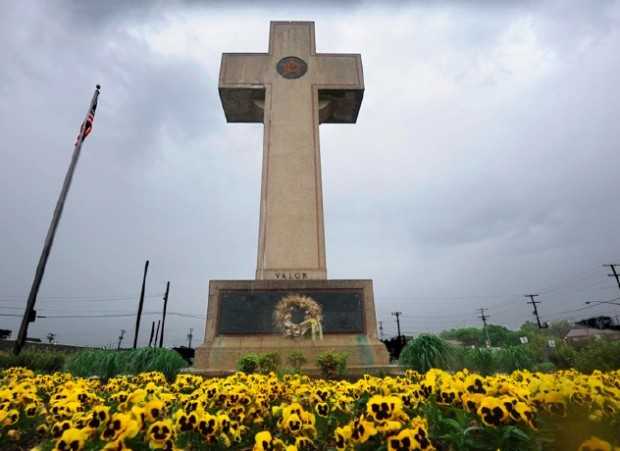 BLADENSBURG, Md. — The Fourth Circuit Court of Appeals has ruled that a Maryland veterans memorial in the shape of a cross violates the Establishment Clause of the U.S. Constitution because it “excessively entangles” the government with religion.
BLADENSBURG, Md. — The Fourth Circuit Court of Appeals has ruled that a Maryland veterans memorial in the shape of a cross violates the Establishment Clause of the U.S. Constitution because it “excessively entangles” the government with religion.
“We hold there is excessive religious entanglement in this case for two reasons. First, the Commission owns and maintains the cross, which is displayed on government property. The Commission has spent at least $117,000 to maintain the cross and has set aside an additional $100,000 for restoration,” wrote Judge Stephanie Thacker, appointed to the bench by then-President Barack Obama.
“Second, displaying the cross, particularly given its size, history, and context, amounts to excessive entanglement because the Commission is displaying the hallmark symbol of Christianity in a manner that dominates its surroundings and not only overwhelms all other monuments at the park, but also excludes all other religious tenets,” she opined.
Thacker, joined by Judge James Wynn Jr., also appointed to the bench by Obama, ruled that the presence of the cross would convey to “any reasonable observer that the [Maryland-National Capital Park and Planning] Commission either places Christianity above other faiths, views being American and Christian as one in the same, or both.”
As previously reported, the Bladensburg World War I Veterans Memorial, also known as the “peace cross,” was erected in 1925 by the American Legion to honor the lives of 49 men from Prince George County who died during the war.
The cross stands 40 feet tall in Memorial Park, and also features a plaque that reads, “The right is more precious than the peace; we shall fight for the things we have always carried nearest our hearts; to such a task we dedicate ourselves.” The site is mainly used by the American Legion for Memorial Day and Veterans Day celebrations.
In 2014, the American Humanist Association (AHA) sued the Maryland-National Capital Park and Planning Commission over the presence of the cross, alleging that it violated the First Amendment to the United States Constitution.
“When the government erects an exclusively Christian monument on government property, it violates this central command of the Establishment Clause by sending a clear message that Christianity is the preferred religion over all others,” said AHA attorney Monica Miller in a statement surrounding the filing of the suit.
In Nov. 2015, U.S. District Judge Deborah Chasanow ruled that the monument is constitutional because it is used for nonreligious purposes and is meant to honor war vets rather than promote any religious message.
“The monument’s secular commemorative purpose is reinforced by the plaque, the American Legion’s seal, and the words ‘valor,’ ‘endurance,’ ‘courage,’ and ‘devotion’ written on it. None of these features contains any religious reference,” she wrote. “[The construction of the cross] was not an attempt to set the imprimatur of the state on a particular creed. Rather, those who erected the cross intended simply to honor our nation’s fallen soldiers.”
AHA then filed an appeal with the Fourth Circuit Court of Appeals, which ruled 2-1 on Wednesday that the memorial is unconstitutional. It said that because there are no other religious symbols in the park, the memorial sends the message that the government favors Christianity over other religons.
“Although the reasonable observer may recognize that the cross is located in the Veterans Memorial Park, such reasonable observer also could not help but note that the cross is the most prominent monument in the park and the only one displaying a religious symbol,” Thacker wrote.
“Further, the reasonable observer would know that a Latin cross generally represents Christianity. These factors collectively weigh in favor of concluding that the Cross endorses Christianity—not only above all other faiths, but also to their exclusion,” she asserted.
Judge Roger Gregory, nominated to the bench by then-President Bill Clinton, dissented, opining that most observers would simply consider the display as a veterans memorial and not the promotion of religion. He noted that the courts have ruled that it is not necessary to scrub all traces of religion from public life in order to remain neutral.
“I conclude that a reasonable observer would understand that the memorial, while displaying a religious symbol, is a war memorial built to celebrate the forty-nine Prince George’s County residents who gave their lives in battle,” he wrote.
“We must be careful not to push the Establishment Clause beyond its purpose in search of complete neutrality,” Gregory warned. “‘[U]ntutored devotion to the concept of neutrality can lead to invocation or approval of results which partake not simply of that noninterference and noninvolvement with the religious which the Constitution commands,’ but of extreme commitment to the secular, ‘or even active, hostility to the religious.’”
AHA applauded the ruling, stating that the monument’s message is too narrow.
“Government war memorials should respect all veterans, not just those from one religious group,” Executive Director Roy Speckhardt said in a statement. “Religious neutrality is important in a pluralistic society like ours.”
But the religious liberties group First Liberty expressed deep concern and vowed to appeal.
“If this precedent were allowed to stand, it would affect veterans memorials across the landscape of our country,” President Kelly Shackelford lamented in a statement. “I promise you, we are not going to stop until this is reversed. We and the American Legion, our client, are going to do everything in our power to make sure that this is overturned.”
Become a Christian News Network Supporter...


